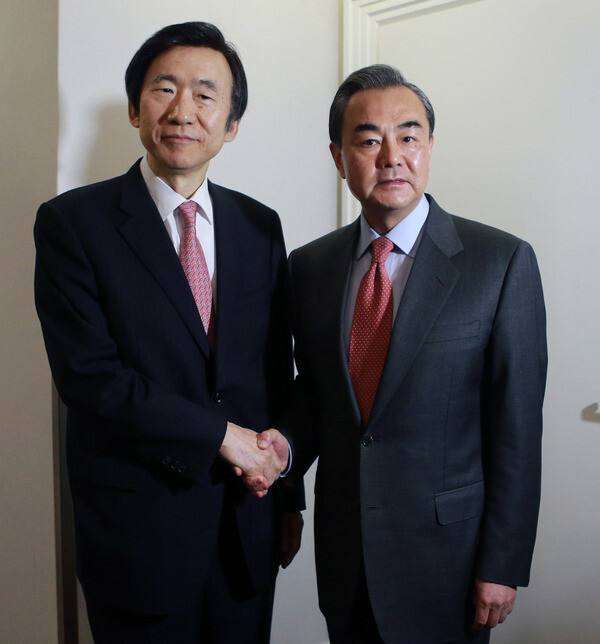hankyoreh
Links to other country sites 다른 나라 사이트 링크
[Editorial] Solve North Korean nukes to address diplomatic and security morass

During several meetings held in Germany between Feb. 16 and 18 around the G-20 Foreign Ministers’ Meeting and the Munich Security Conference, disagreements and friction boiled over among South Korea and neighboring countries. These meetings importantly reconfirmed the overall crisis of diplomacy and national security that South Korea is facing. What is needed in such a situation is fresh momentum and a new approach to pressing issues.
During the meeting between the foreign ministers of South Korea and China on Feb. 18, the deployment of the THAAD missile defense system on the Korean Peninsula became an issue, as expected. South Korean Foreign Minister Yun Byung-se expressed “strong concerns” about China’s punitive measures, while Chinese Foreign Minister Wang Yi reiterated China’s opposition to THAAD by asking South Korea not to hasten the deployment. During a meeting between South Korea and Russia on the same day, Russia expressed its opposition to the deployment of American strategic assets during the South Korea-US joint exercises next month.
On Feb. 17, territorial claims to Dokdo, distortions in Japanese textbooks on that issue and the comfort woman statue were raised during a meeting between South Korea and Japan, while the Senkaku Islands (Diaoyu Islands in China) came up in China’s meeting with Japan. Northeast Asia as a whole seems fraught with a variety of friction.
Amidst all these disagreements is the issue of North Korea’s nuclear weapons and missile programs. While the top diplomats from the US and South Korea resolved in a bilateral meeting and a trilateral meeting with Japan’s Foreign Minister on Feb. 16 to strengthen sanctions and pressure on North Korea, China and Russia called for a solution to be found through dialogue. There were even signs of a showdown during a meeting between US and China on Feb. 17, with US Secretary of State Rex Tillerson urging Wang to employ all available means to discourage North Korea from destabilizing behavior. The mood is such that other friction could be amplified if the North Korean nuclear issue is not brought under control. It is quite likely that South Korea has the most to lose from this eventuality.
China’s attitude deserves watching in connection with this. Wang emphasized on Feb. 17 that since the US and North Korea are the two countries most directly involved with the nuclear issue, they must take bold political action as soon as possible. At the same time, China announced that it would completely suspend imports of North Korean coal from Feb. 19 through the end of the year. This was in response to calls from South Korea and the US for China to play a larger role.
The South Korean government needs to take these movements as an opportunity to find a solution to the nuclear issue that will be acceptable to all of its neighbors. Most importantly, it must ensure that the friction between the US and China is not exacerbated by disagreement over how to solve the nuclear issue.
The administration of President Park Geun-hye bears much of the blame for South Korea’s diplomatic and security dilemma. This is the result of hasty decisions about the THAAD deployment, the comfort women issue and inter-Korean relations. Meanwhile, the nuclear issue continues to deteriorate. Breaking out of this dilemma requires changing the bigger trends. Most important is finding an effective solution to the nuclear issue.
Please direct questions or comments to [english@hani.co.kr]

Editorial・opinion
![[Column] Park Geun-hye déjà vu in Yoon Suk-yeol [Column] Park Geun-hye déjà vu in Yoon Suk-yeol](https://flexible.img.hani.co.kr/flexible/normal/500/300/imgdb/original/2024/0424/651713945113788.jpg) [Column] Park Geun-hye déjà vu in Yoon Suk-yeol
[Column] Park Geun-hye déjà vu in Yoon Suk-yeol![[Editorial] New weight of N. Korea’s nuclear threats makes dialogue all the more urgent [Editorial] New weight of N. Korea’s nuclear threats makes dialogue all the more urgent](https://flexible.img.hani.co.kr/flexible/normal/500/300/imgdb/original/2024/0424/7317139454662664.jpg) [Editorial] New weight of N. Korea’s nuclear threats makes dialogue all the more urgent
[Editorial] New weight of N. Korea’s nuclear threats makes dialogue all the more urgent- [Guest essay] The real reason Korea’s new right wants to dub Rhee a founding father
- [Column] ‘Choson’: Is it time we start referring to N. Korea in its own terms?
- [Editorial] Japan’s rewriting of history with Korea has gone too far
- [Column] The president’s questionable capacity for dialogue
- [Column] Are chaebol firms just pizza pies for families to divvy up as they please?
- [Column] Has Korea, too, crossed the Rubicon on China?
- [Correspondent’s column] In Japan’s alliance with US, echoes of its past alliances with UK
- [Editorial] Does Yoon think the Korean public is wrong?
Most viewed articles
- 1[Column] Park Geun-hye déjà vu in Yoon Suk-yeol
- 2Will NewJeans end up collateral damage in internal feud at K-pop juggernaut Hybe?
- 3The dream K-drama boyfriend stealing hearts and screens in Japan
- 4Thursday to mark start of resignations by senior doctors amid standoff with government
- 5Why Korea shouldn’t welcome Japan’s newly beefed up defense cooperation with US
- 6[Guest essay] The real reason Korea’s new right wants to dub Rhee a founding father
- 7N. Korean hackers breached 10 defense contractors in South for months, police say
- 8[Editorial] New weight of N. Korea’s nuclear threats makes dialogue all the more urgent
- 9Up-and-coming Indonesian group StarBe spills what it learned during K-pop training in Seoul
- 10Terry Anderson, AP reporter who informed world of massacre in Gwangju, dies at 76